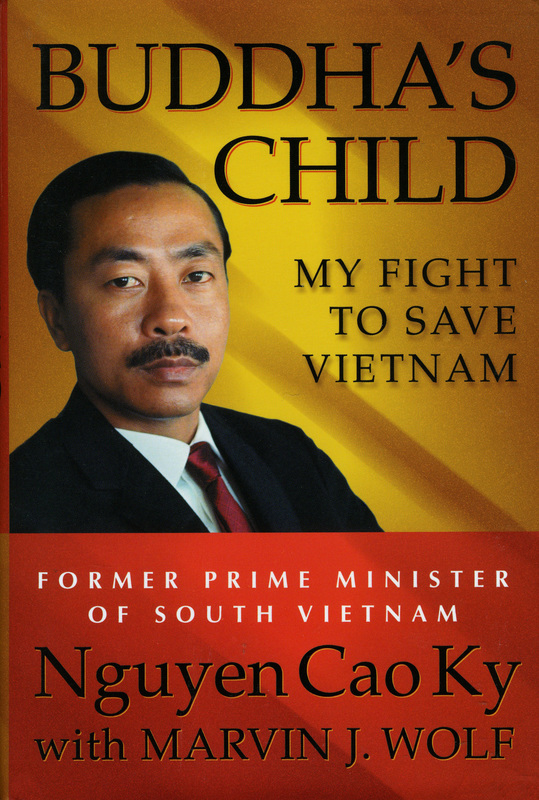|
Overview ꟾ Reviews
Reviews for Bhudda's Child
Publishers Weekly "Ky provides an insider's look at the political machinations within South Vietnam during the American war. The one man who knew how to defeat the communists in Vietnam in the 1960s and '70s and had the wherewithal to do so was Nguyen Cao Ky, the South Vietnamese Air Force general who was the unelected prime minister of that nation from 1965 to 1967 and vice president from 1967 to 1971. But Ky was thwarted by venal, incompetent and corrupt South Vietnamese politicians especially his successor, Nguyen Van Thieu, by the evil, double-dealing Vietnamese communists, and by wishy-washy, ignorant American political and military leaders. That's the version Ky presents in this self-serving, self-aggrandizing memoir. Ky says his plan to lead an invasion of North Vietnam in 1966, which 'would have ended the war,' was squelched by timid Johnson administration officials. His plans to introduce democracy were continually beaten back by his political enemies, including Buddhist leaders who Ky says acted as little more than communist dupes. Ky whitewashes his government's excesses, which included a violent crackdown on the protesting Buddhists, heavy-handed intimidation of the press and of his political enemies. Ky (with the aid of veteran author Wolf) provides an insider's look at the political machinations within South Vietnam during the American war. But that view is shown through his vehemently anticommunist and egocentric lens. In addition, his explanation of the most portentous event in his political life allowing his political archenemy Thieu to be nominated as the military directorate's candidate for president in 1967 is stupefyingly unbelievable. Ky claims that the reason he gave his blessing to Thieu to become president 'remains a great mystery, even to me.' That mystery led to Ky's political downfall and to eight years of a corrupt, ineffectual Thieu-led South Vietnamese regime." Booklist, American Library Association "Against the background of the war, and expressions of his patriotism, Ky's recollections will certainly contribute to assessments of South Vietnam's viability and fate. For a period in the mid-1960s, the de facto leader of South Vietnam, Ky, presented a flamboyant contrast to the nominal leader and president, the cautious and--according to Ky--corrupt Nguyen Van Thieu. Sporting silk scarves and a pearl-handled revolver, the weapon a gift from John Wayne, Ky made good copy for the press. His memoir will attract interest for the accounts of dealings with U.S. ambassadors and, most of all, the political turmoil in Saigon that preceded and followed the military's overthrow and murder of Ngo Dinh Diem in 1963. Ky backed the coup and emerged from it as air force commander and then, by 1965, premier. In that office, he did crack down on graft and introduced a semblance of constitutional government. Against the background of the war, and expressions of his patriotism, Ky's recollections will certainly contribute to assessments of South Vietnam's viability and fate." Gilbert Taylor. Copyright © American Library Association. All rights reserved The Washington Post Book World "Ky's story provides an interesting picture of the man who ruled the tail that wagged the American dog in the mid-1960s." Peter Ross Range Kirkus Reviews "Insightful . . . Modest and keenly detailed, a welcome contribution to the literature of the Vietnam War." Harold G. Moore, Lt. General, U.S. Army (Ret.), and coauthor of We Were Soldiers Once . . . and Young "A remarkable, fascinating read. An unbelievably candid yet credible account of the tortured U.S./Vietnam relationship, and the incompetence and corruption of many of the senior Vietnamese leaders. Buddha's Child reveals previously unpublished incidents of significant importance. Students of the French and American Wars in Vietnam will find this hard-hitting book difficult to put down." Harold G. Moore, Lt. General, U.S. Army (Ret.), and coauthor of We Were Soldiers Once . . . and Young Jack Laurence, former CBS News correspondent and author of The Cat from Hue: A Vietnam War Story "Nguyen Cao Ky reveals what went on behind the scenes at the highest levels of the Saigon and Washington governments: the coup d'état, the secret deals, the rivalries and intrigues, the revolts, the astonishing greed and corruption of his fellow generals, the conspiracies and betrayals, and, ultimately, the tears. Intimate, honest, and revealing on every page, this is a necessary piece of the history for all who want to know what really went on at the top." Santa Cruz Sentinel "[Ky] makes a case too remarkable to doubt. His take on America's role in Vietnam makes too much sense to dismiss . . . Honest criticism from an informed ally is well worth our attention." Ron Honig |
|
|
Member, Military Writers of America
|
Website © 2016 Marvin J. Wolf. All rights reserved on website design, images and text. ꟾ Updated regularly.
Design by Andesign. |
Professional Reader, NetGalley
|

